The history of boxing must be rewritten. It is officially recorded that the legendary Jack Dempsey, Heavyweight Champion of the World from 1919-1926, was KO’ed just once in his great career. He was knocked out in the first round in 1917 by fireman Jim Flynn. The truth is that he actually suffered two KO’s. The second one was outside the ring in 1956 when he first laid eyes on Deanna Piatelli. His gorgeous sparring partner for the following 30 odd years in the marriage stakes, Deanna knocked out the champ with her renowned beauty and style — only this time the champ felt no pain.
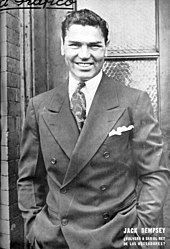
A successful businesswoman, Deanna owned several fine costume jewelry shops in the shopping arcades of prestigious hotels in New York. One day, due to a staff absence because of illness, Deanna herself was waiting on customers in her shop in the Manhattan Hotel which was between 44th and 45th Streets on 8th Avenue. A handsome man walked in to get one of his cufflinks repaired. She politely explained that her shops didn’t offer such a service. Nevertheless, the gentleman persisted in chatting to her and asked Deanna her name. Then with a huge smile on his face he introduced himself as “John L. Sullivan,” an assumed name which meant nothing to Deanna but would have had much meaning to boxing fans as would the true identity of the georgeous gentleman.
As “John L. Sullivan” turned and left the shop Deanna noticed everyone in the hotel lobby looking at her. At least she thought they were looking at her. However, the bell captain soon dashed that illusion. He asked Deanna if she had any idea to whom she had just been so casually talking. When she replied that it was John L. Sullivan he burst out laughing and straightened her out: “You don’t know who that was? That was Jack Dempsey, the greatest Heavyweight Champion of the World ever!”
Sport – especially boxing had never been of much interest to Deanna. Games and matches at Madison Square Garden had never enticed Deanna away from her interest in classical music at Carnegie Hall or operas at the Met. Consequently, she was totally ignorant of the real John L. Sullivan’s fame as the champion boxer of the 1880s who had inspired the book The Modern Gladiator and, in turn, the young Jack Dempsey.
When Dempsey returned for a second round with Ms. Piatelli it was over very quickly. She confronted him about his true identity; Dempsey apologized and asked her out for a drink or a coffee. She refused.
Third round. Dempsey returns the next day. He’s very persistent and charming but, once again, Ms. Piatelli’s skilled defense is impenetrable. Dempsey scores no points.
It was in the fourth round, the following day, that the Champ begins to break through and make real progress. Deanna conceded, thinking to herself, “To hell with having a coffee with this guy, I’m going to marry him.” However, Deanna’s reputation demanded that before she could even join the Champ for a late breakfast he would have to be properly introduced. A bemused Jack Dempsey motioned to an unsuspecting passerby to come over. The surprised stranger looked bewildered but had no trouble complying when Jack graciously asked the man, “Would you kindly introduce me to this lady?” Incredulous that this should ever be necessary anywhere in the U.S., the man exclaimed, “But Madam, this is none other than the Champ himself, Jack Dempsey!”
After their initial breakfast in the hotel coffee shop, Deanna noticed Jack’s generosity to the waitress. After a forty cent meal he laid a dollar on the table followed by another as they left. When she remarked on this, Jack replied, “Are you saving my money for me already?” Building on aggressive moves in the fourth round, the Champ moved swiftly to a KO — they were married late that same year. Deanna was his fourth wife.
Jack Dempsey was born on June 24, 1885, in Manassa, Colorado, from whence stems his nickname, “The Manassa Mauler.” His father, Hyrum Dempsey, was an Irish schoolteacher, his mother Celia, a Scot. With eleven children to support, times were lean and tough. When Jack was five, Hyrum Dempsey decided to leave Manassa and move even further west.
Enduring much hardship in freezing temperatures and fending off pneumonia and other ills, the family settled in Montrose, Colorado. During those years in Montrose, Jack began to fight at the age of ten, encouraged by his mother, who had opened a restaurant called the Rio Grande Eating House. As a teenager, Jack started his career in the saloons where fights were held most days. He fought anybody in the house, passing the hat around for 50 cents, maybe 75 cents if the crowd was feeling generous. It proved to be a good training ground, teaching Dempsey skills that were to make him famous.
Deanna recalls, “Jack told me how difficult life was in those days in Colorado. His happiest times were those spent working in the mines making $3 or $4 a day.” Jack’s original name was William Dempsey but his family, except for his mother, called him Harry. When he left the family at age 16 in 1911 he adopted the name of Kid Blackie Dempsey. Penniless, he “rode the rods,” an expression for traveling on the two steel beams that run under the belly of a Pullman car. It was dangerous, slipping or falling off the rods meant certain death, but Dempsey was determined and had little choice.
Jack had become a hobo but differed from many others by his eagerness to work. He did everything from mining, cutting lawns, digging ditches to washing dishes, but the thing he liked best was fighting. From 1911 to 1914 Dempsey, traveling through Utah, Nevada and Colorado, had hundreds of barroom battles. A skinny, scared teenager weighing about 130 pounds with a high shrill voice didn’t look or sound particularly fearsome in barrooms where looking really tough and sounding gruff was the rule rather than the exception.
Jack had a routine. He would swagger into a saloon and announce, “I can lick any s.o.b. in the house.” He won most of these fights but occasionally he lost and, when he could see that he was badly overmatched, he would, as he put it, “run like hell.” Another gimmick he had to dram up fights was to approach the bartender and ask if there was anyone the bartender would particularly like to see get his comeuppance from a skinny little kid. There was usually one local bully whose prospective downfall would have the bartender practically salivating, and a match was speedily arranged. The “gate” was collected by passing a hat, and half of as much as $50 would go to Jack and the other half to the bartender.
Today, as we sit in her gracious apartment on New York’s fashionable East Side, Deanna Dempsey exudes the same glamour and warmth that captivated the Champ forty years ago. Deanna recalls how Jack told her how he graduated to professional prize-fighting from barroom battler, how he moved from the West to New York, and how his name changed from William to Harry to Kid Blackie to Jack. Jack’s older brothers Bernie and Johnny had both used the name Jack in their brief boxing careers so, in a sense, Jack inherited the name from them but there was another source, too. A middleweight Irish fighter of the late 19th century also used the name Jack Dempsey, so it seemed quite proper that any Irishman named Dempsey should adopt Jack as a first name.
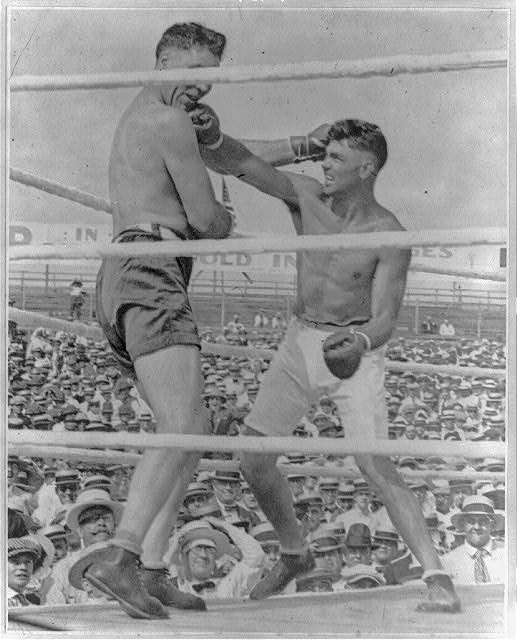
Photo courtesy of the Library of Congress.
Dempsey became Heavyweight Champion of the World on July 14, 1919. He fought Jess Willard in Toledo, Ohio in a fight promoted by Tex Rickard. Dempsey knocked the heavier, taller man down seven times before knocking him out in the fourth round.
“After we were married, Jack asked me if I would like to see a reel of him when he first became World Champion. I agreed, never having ever seen him fight. Jess Willard was a big man, 6’5″ weighing about 250 pounds. My husband was 6’2″ and weighed about 180. When Jack entered the ring and saw his opponent, he thought, `My God, I’m not fighting for a championship, I’m fighting for my life.’ When the film of the fight was over, I was shocked. I could not believe what I had just seen. I asked him, `How could you do this to a man? You nearly killed him! You broke his jaw! You broke his nose!’ You see, to me Jack was my husband, a gentle soul, a pussycat. He told me, `Sweetheart, when you go in the ring, you don’t see anything, you don’t hear anyone. You just see that man in front of you, that man you’re fighting. And I was fighting, I had to win, I just had to win.’ He then admitted to me that he felt very sorry for him afterwards.”
Dempsey’s victory over Willard, the man who had beaten the much maligned Jack Johnson in the famous fight in Havana, Cuba, was a sensational victory for Jack and for his manager, Doc Kearns, who had maneuvered him into that spot where he had the chance to fight for the World Championship and win it.
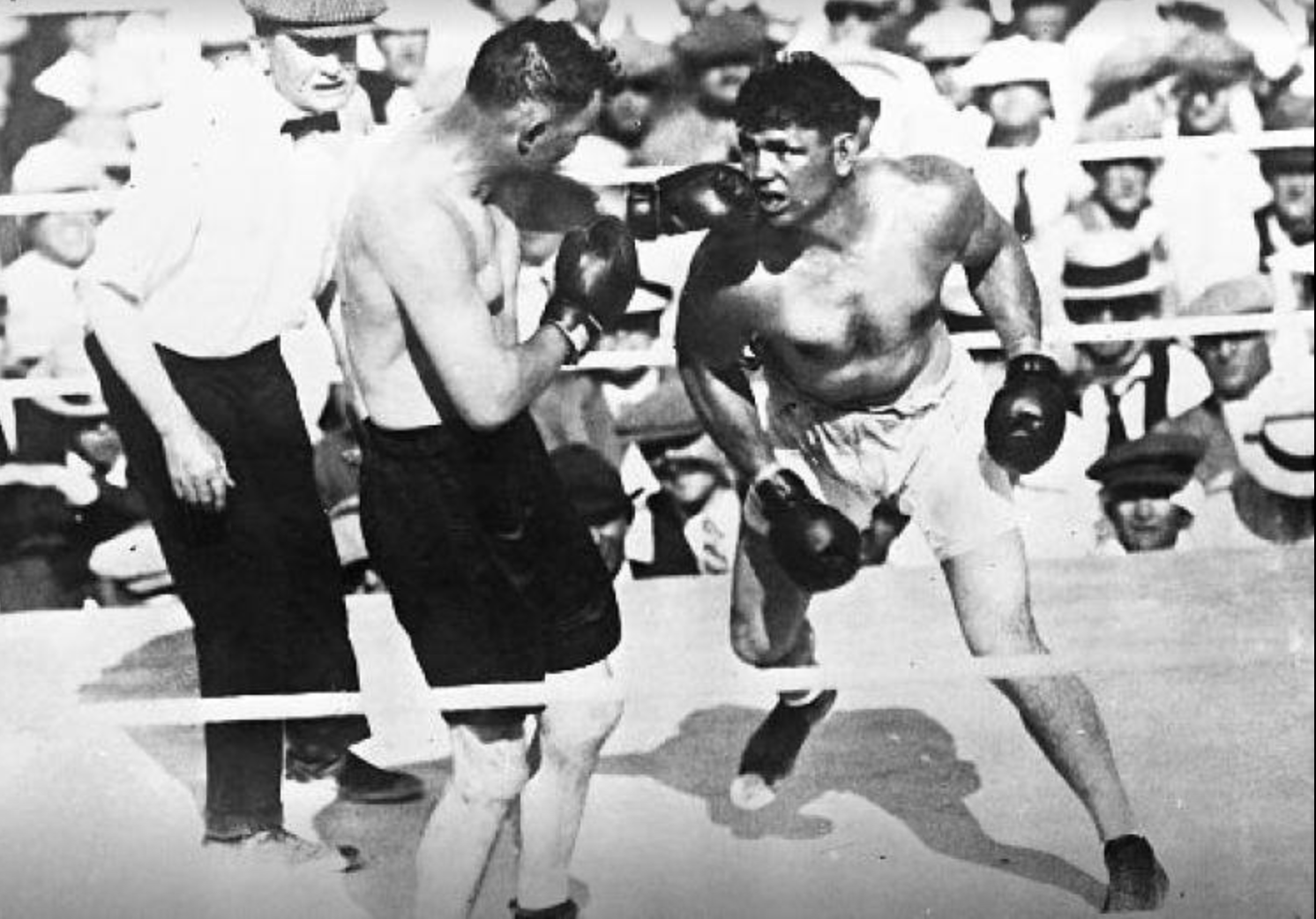
Dempsey’ s controversial career took him on to fight and defeat the Frenchman George Carpentier. The fight was held in Jersey City on July 2, 1921 and it was dubbed “The Battle of the Century.” Cleverly promoted by Tex Rickard, it was the first million dollar gate in the history of boxing.
Deanna remembered Carpentier: “They were all good sports. Even though Carpentier lost to Jack, they became good friends for life. He adored Jack and always flew over from Paris to see us when we were in London. It was the same with Jack and Gene Tunney, only when they fought it was Jack who lost, but they, also, remained friends throughout their lives.”
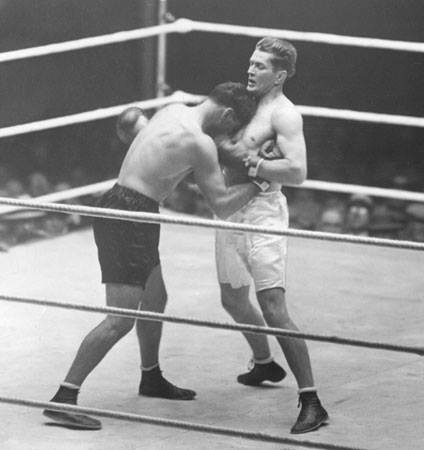
After Dempsey lost his title to Tunney on September 23, 1926, he was asked how he had been defeated. Jack replied, “I forgot to duck!” He attempted to regain his title one year later in a fight at Chicago’s Soldiers’ Field. Dempsey landed the blow that sent Tunney to the canvas for the famous “long count” in the seventh round. It was one of the most controversial incidents in sports history. Dempsey waited before he moved to a neutral comer and, under the new rules, referee Dave Barry delayed starting the count over Tunney.
Gene had 14 seconds on the canvas to rest. He got up, recovered his senses and went on to outbox Dempsey, who had come so close to regaining his title. It was actually in his defeat that Dempsey became the victor. There are people throughout the country who feel to this day that he was robbed.
“Jack took me to several fights. Cassius Clay was fighting Sonny Liston. I was distracted for a moment when my gloves slipped off my knees onto the floor. I bent down to retrieve them and, as I did so, my husband took my arm and said `Let’s go!’ `Why?’ I asked. `It’s over,’ he said. Well, that was it. Apparently Liston had retired with a bad arm, making Cassius Clay the new champion and I managed to miss it by a blink.”
“Another time we went to Puerto Rico; Cassius Clay was by that time calling himself Mohammed Ali. There was a party before the fight and Ali, a very striking and funny man, came over to Jack. `Mr. Dempsey,’ he said, `can I call you Jack?’ Jack said, `Of course, everyone calls me Jack.’ Ali smiled and continued, `Jack, you are the greatest!’ Jack said in a bemused tone, `Well, that’s strange. I thought you always say that you are the greatest.’ Ali chuckled, put his hand to the side of his mouth as if sharing a confidence, and loudly whispered, `That’s just me talking bullshit!'”
Jack’s popularity was as legendary outside the ring as inside it. He sparred with J. Paul Getty and the great Harry Houdini. During the early 1920s he shared an apartment with Charlie Chaplin and Douglas Fairbanks Sr. while making movies such as The Health Farm Wallop and The Winning Way. Deanna laughed, “He really was a ham. He could not act at all and to see him in all that makeup was so funny. He really didn’t like it much.
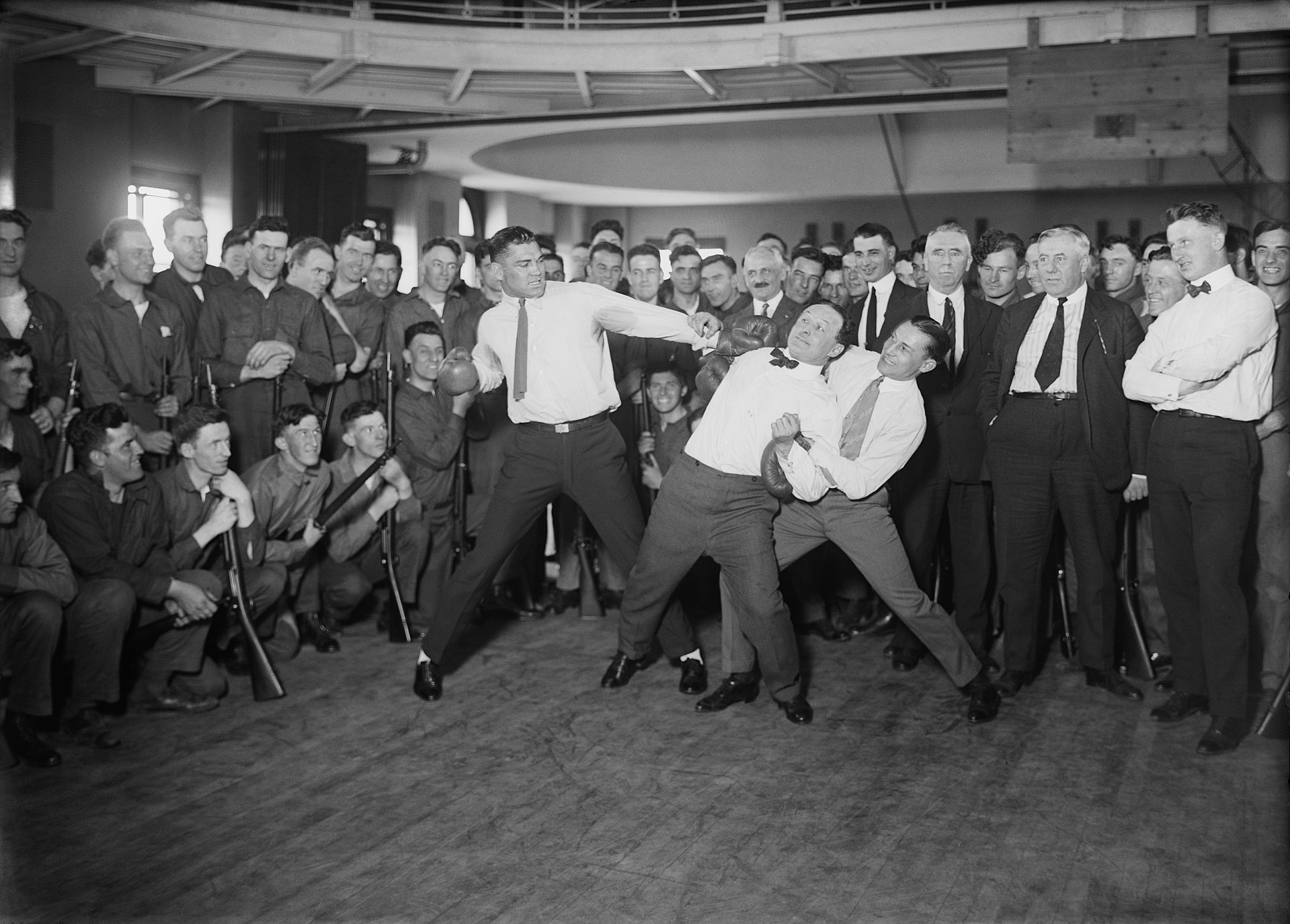
“I met several Presidents with Jack: Eisenhower, Johnson, Reagan and Bush. We were often invited to the White House along with movie stars such as Gregory Peck and his wife Veronica, and Cary Grant. Cary was with a date and he came over to us and asked Jack what his secret of eternal youth was. Jack pointed at me. `She keeps me young.’ Cary smiled at me and inquired, `Have you got a sister for me?'”
“Jack was extremely proud of his Irish heritage. He visited Ireland many times, once as the guest of President Eamon de Valera. When Jack toured Ireland he went to the racing at the Curragh which he loved. Unfortunately, I didn’t get to go with him. I did, however, get a taste of Jack’s love for all things Irish when we used to dine at Neary’s on East 57th St. in New York. Jimmy Neary always gave us a warm welcome. Occasionally we’d listen to Governor Carey singing Irish favorites while enjoying Neary’s delicious lamb stew and mashed potatoes.”
“Jack didn’t drink hard liquor. Maybe just a beer or two during the hot summer months. He also liked to go to Gallagher’s and McGuinesses; only, of course, when he could get away from his own restaurant, Jack Dempsey’s, which he owned (with a partner) and managed for 25 years. It was on Broadway between 49th and 50th Street [the street sign on 49th and Broadway reads `Jack Dempsey’s Comer’]. He really preferred my cooking for him at home, pasta being his favorite; but when he had to dine out he would carefully study the menu before ordering his regular steak with a baked potato. He loved a good steak.”
Jack Dempsey was an astute self-educated man with a sharp eye for business. Apart from his famed restaurants in New York and in Miami Beach he had interests in both real estate and hotels on both the east and west coasts. However, he suffered a huge financial loss in the crash of `29. Jack lost something in the neighborhood of $4 million which is the equivalent of $50 million today. Jack was in Chicago when the crash hit and he had to borrow money from friends to return to New York. He resumed fighting to make money to support his family. “He told me,” says Deanna, “that he did not stay at that too long. He had seen too many fighters make the mistake of taking on one fight too many and being mined for life.
“Physically he was magnificent. His nose had been broken several times, of course, but his face was unscarred. It was a gorgeous face. I don’t think that Jack would approve of today’s antics in boxing. He was always above all a gentleman and a true sportsman. He did not approve of gratuitous violence in the movies or of explicit sex scenes. I guess he was old-fashioned in that way, he never even swore.
“Jack was always a pacifist, wanting everyone to live in harmony. The idea of brother fighting brother appalled and saddened him. He longed for peace, not only in Ireland, but throughout the world.”
The enormous love and respect that people felt for Dempsey manifested itself in two memorable occasions. Deanna, a cultivated linguist, was brought up to listen to opera during her childhood in Italy. She longed for Jack to share her enthusiasm for the arts, especially the opera. Finally, she persuaded him to attend a dress rehearsal of Puccini’s “Madama Butterfly” at New York’s Metropolitan Opera House. “When the cast heard we were in the house, the whole orchestra stood up to pay tribute to my husband. During the opera I saw Jack watching intently. When it was over he expressed real joy but sadness, too. Sadness that he had not seen opera before.
“On Jack’s 75th birthday we were invited to Madison Square Garden. He was invited up on stage and an astounding thing happened. Nineteen thousand people, the whole audience, stood up to sing `Happy Birthday’ to him. Tears were streaming down my face, I am still moved today when I remember that moment. Afterwards, Jack, modest as ever, confided to me that he felt somewhat embarrassed but grateful that so many remembered and loved him still.
“I think that the real key to this incredible adulation was in the way Jack conducted himself throughout his life. He never forgot where he came from, treating everyone the same whether it was a President of the U.S. or a barman. He had time for everyone, never being too busy and never turning his back on anyone. He always said, `They gave me their time so I’ll always give them mine.’
“Jack worked with young people, stressing the importance of getting a good education whether it be vocational or academic. He set an example for many who in moments of adversity saw no light or hope at the end. He was a hero to many who had overcome hard times through sheer perseverance. He was a humble man who never neglected to extend friendship to those who knew him and even to those who didn’t. I’ll never forget a couple, customers in the restaurant who revealed that, unbeknownst to me, Jack had put their two children through college. His generosity was enormous and he was always so modest with it.”
When Jack Dempsey met Deanna, her beauty, style and glamour were obvious. What he was yet to discover were her intelligence, artistic talent, warmth and courage. As we talk to her today, behind her sits an impressive bust of Jack which Deanna herself sculpted, along with a number of her other bronzes. “I just picked up some clay one day and started playing with it. Jack had the most beautiful hands; I’ll always regret not sculpting them.” Jack died in 1983.
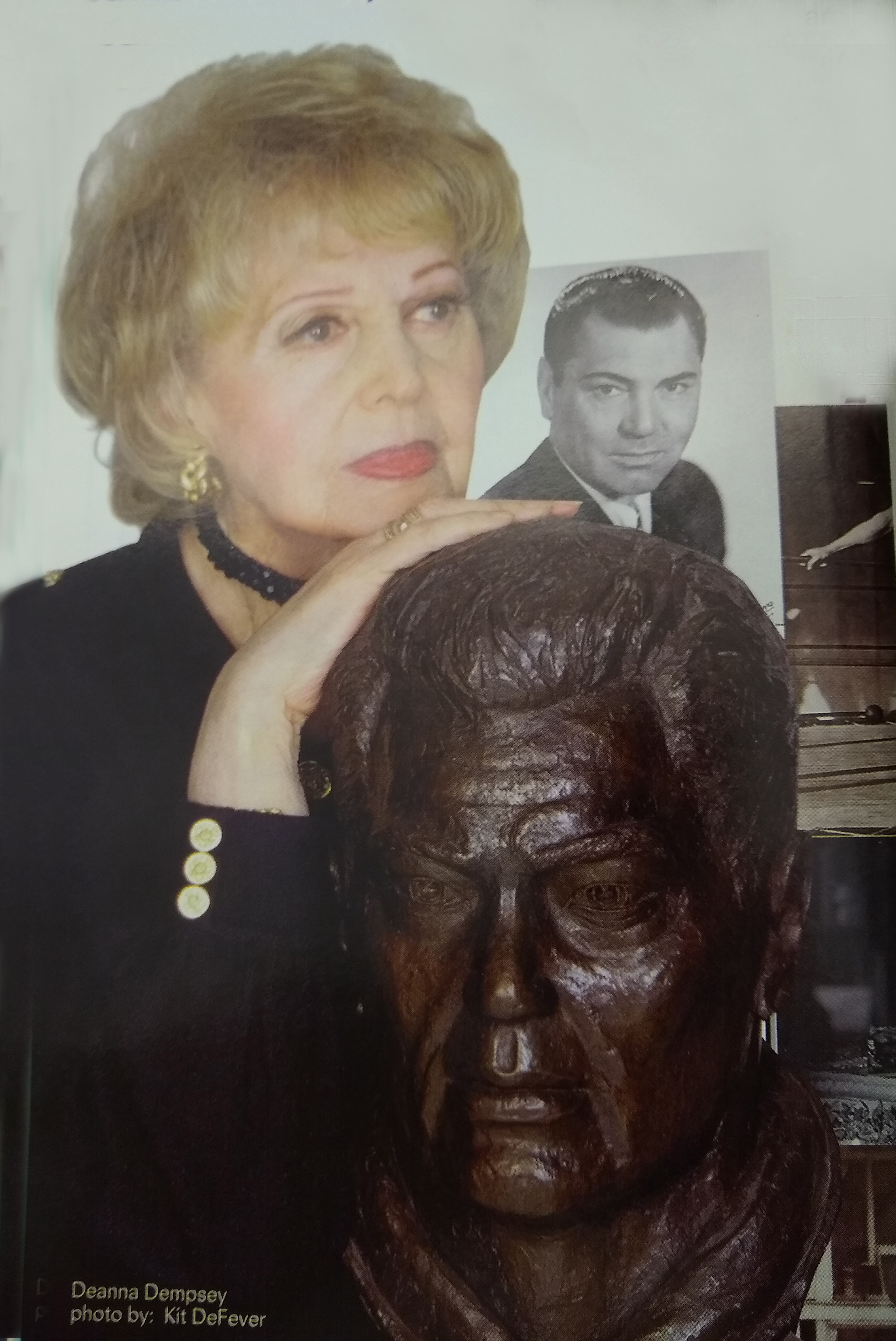
Photo by Kit DeFever
Jack Dempsey acknowledged his love and admiration for Deanna when he inscribed these words in one of the many biographies of him: “To Deanna, the fourth who should have been the first.”
“The only thing I now truly hope for is that my grandson will have his wish come true. He’s always hoped that his stamp collection would be graced by a U.S. stamp commemorating his grandfather, Jack Dempsey.”
Editor’s Note: This article was originally published in the May / June 1998 issue of Irish America. ⬥
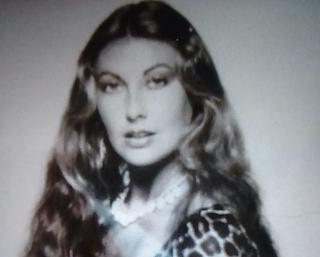 Marilyn Cole Lownes: Having worked for Playboy as a bunny girl and playmate, it was Leroy Neiman, the artist, who introduced Marilyn to the boxing world. Inspired by her interview with Deanna Dempsey, and realizing the passion and courage of fighters, Marilyn went to become a boxing journalist interviewing such greats as Irish Mickey Ward, and John Duddy, and co-authoring articles with Boxing Hall of Fame writer Tom Hauser, including pieces on Floyd Mayweather’s love of bling, and boxing promoter Don King.
Marilyn Cole Lownes: Having worked for Playboy as a bunny girl and playmate, it was Leroy Neiman, the artist, who introduced Marilyn to the boxing world. Inspired by her interview with Deanna Dempsey, and realizing the passion and courage of fighters, Marilyn went to become a boxing journalist interviewing such greats as Irish Mickey Ward, and John Duddy, and co-authoring articles with Boxing Hall of Fame writer Tom Hauser, including pieces on Floyd Mayweather’s love of bling, and boxing promoter Don King.

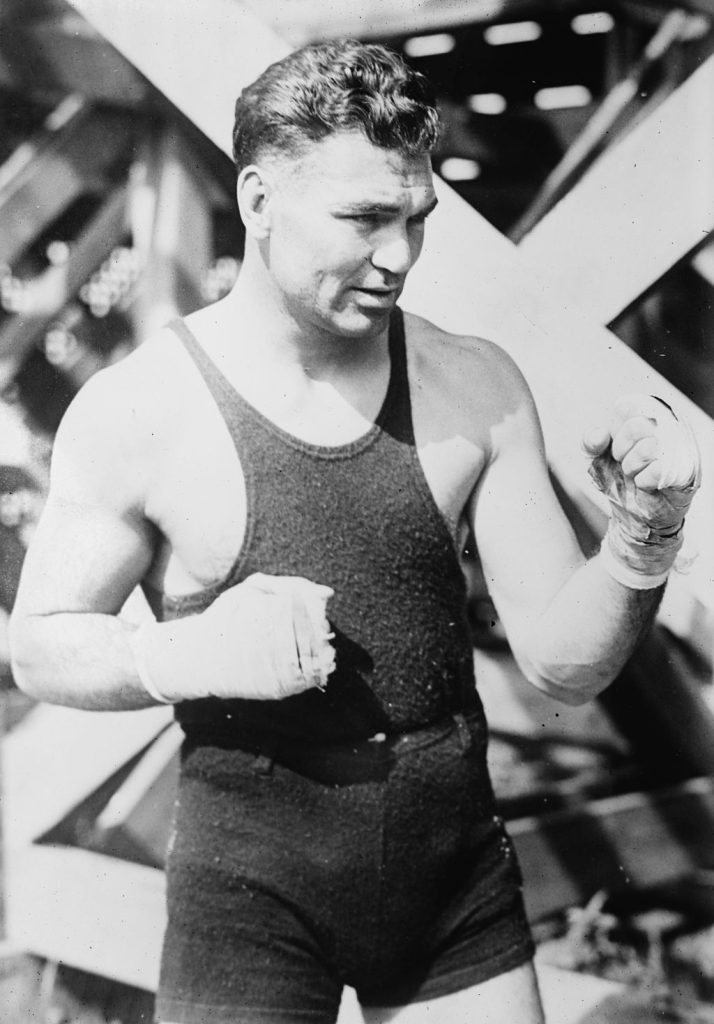
What a great article . Mike Tyson loved Jack Dempsey and he is a true American hero !
God bless him and his family ! He had class !
The ethnicity referenced in this article is far different from what I had previously known. I believed he was of Irish, Italian, and Native American extraction. But who knows for sure?
On another vein, World Heavyweight Champion, James J. Corbett’s father was born about 10 minutes walk from where I came from in a village called Ballycushion. His mother was from the little town of Shrule about 2.5 miles away. Both are in County Mayo.
Fantastic article of Dempsey. Marilyn Cole is a great boxing journalist. Congrats!